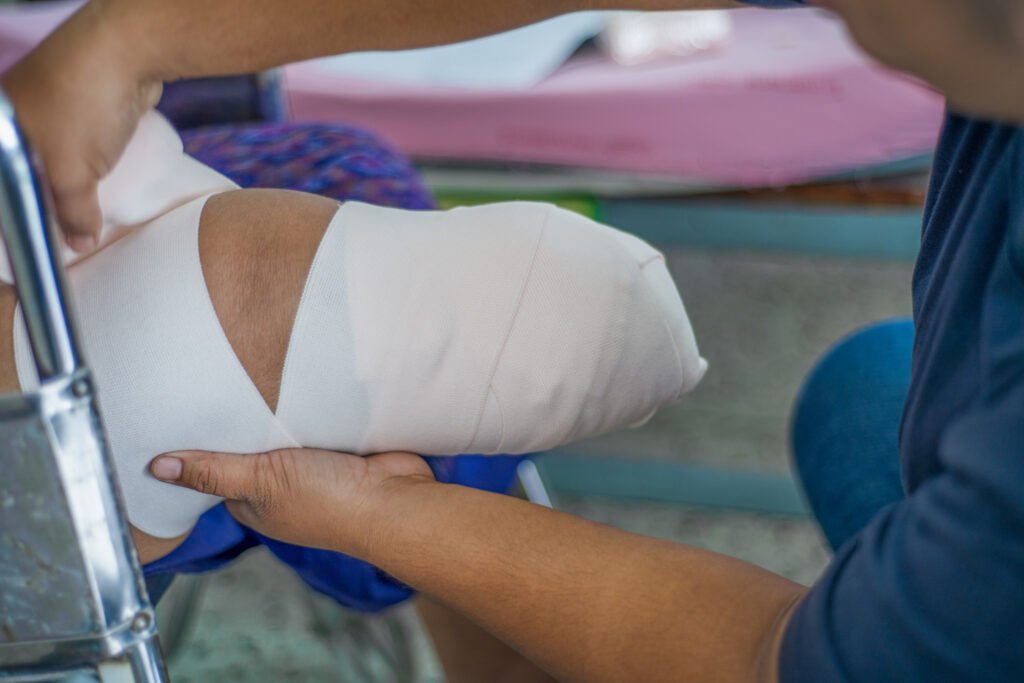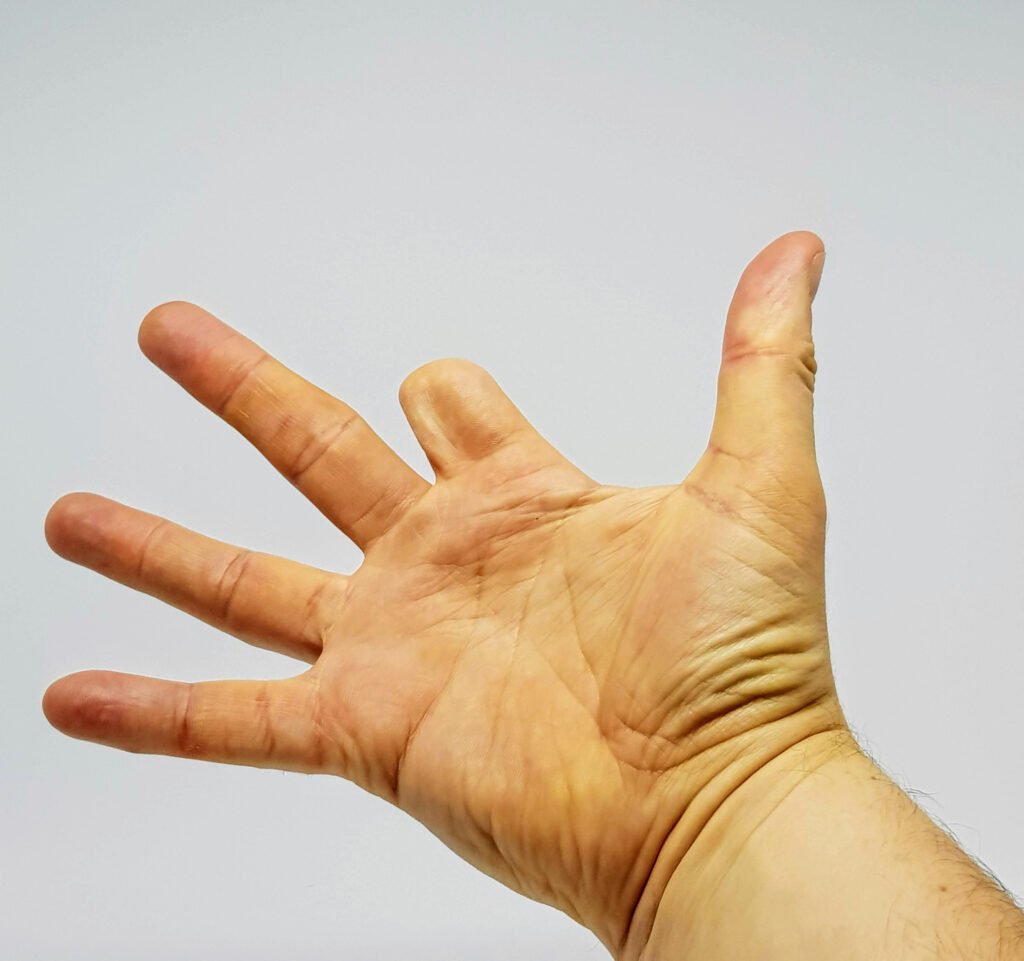Advice On Amputation Claims
100% No Win No Fee
Read our guide to learn who is eligible to make amputation claims.
Excellent Reviews On

Advice On Amputation Claims
100% No Win No Fee
Read our guide to learn who is eligible to make amputation claims.
Excellent Reviews On
As featured in:




Amputation Claims With No Win No Fee Solicitors
Amputation claims are a type of personal injury claim for compensation after experiencing the loss of a limb at the hands of someone else’s negligence. These types of claims can arise following a serious accident, such as a road traffic accident, an accident at work, or an accident in a public place. Amputation claims can also occur in cases of medical negligence.
In successful amputation compensation claims, compensation can consider physical, mental and financial implications caused by suffering this type of injury, which in most circumstances has life-changing impacts. Continue reading to learn more, or use our contact details below to be connected with one of our advisors.
Contact Us
To reach our friendly advisors today, you can reach us by:
- Calling us on 0333 091 8598
- Filling out our contact us form
- Using the live chat

Can I Make A No Win No Fee Claim After An Amputation?
You could make a No Win No Fee amputation claim, provided your case satisfies the eligibility criteria. We can determine this by proving three key elements:
- You were owed a duty of care by a third party
- The third party who owed you the duty of care breached this
- Their breach caused your limb loss or amputation
A duty of care is a legal responsibility to ensure the reasonable safety of another. You are owed a duty of care is various circumstances, such as:
- On the roads
- In public places
- At work
- When being provided medical treatment
Later in this guide, we explain who owes you a duty of care in these various instances.
Continue reading this guide to learn how our No Win No Fee solicitors could help you. Additionally, you can contact our advisors to discuss your case.
Why use us?
Free Consultation
We offer a free consultation to anyone looking to make a claim
No win, no fee
Claim experts
We use solicitors who have handled thousands of claims

Why Work With No Win No Fee Solicitors?
Working with one of our No Win No Fee solicitors under the terms of a Conditional Fee Agreement comes with many benefits.
Firstly, you would have no upfront payments for a solicitor to begin working on your case. You would also have no costs to pay for the solicitor to continue working on your case. Furthermore, no service fees would be required if your claim were unsuccessful.
If your claim is successful, a small fee will be deducted from your compensation, known as a success fee. This is a legally capped percentage in accordance with the Conditional Fee Agreements Order 2013, to ensure you receive the majority of your compensation.
If you have any questions about working with one of our solicitors on a No Win No Fee basis, get in touch with our advisors today. They are available to answer any questions you might have.
How Can No Win No Fee Solicitors Co. Help Me?
Our solicitors, here at No Win No Fee Solicitors Co., have decades of experience advocating for clients with valid amputation claims; they are experts in their field and can offer you support and guidance throughout the process.
In addition to the benefits of working on a No Win No Fee basis, by instructing one of our solicitors, you could expect:
- Help with evidence gathering
- Clear and easy to understand explanations of legal terms and the claim process
- Support when applying for and help securing interim payments
- Ensuring your claim is started within the time limits
- Handling all aspects of your claim so you can focus on your recovery
- Connecting you with specialists such as physiotherapists or occupational therapists
This isn’t all that our solicitors could do for you; contact us today to learn more about how we can support you through the process of your own amputation claim.
Calculating The Amount Of Amputation Compensation
When calculating the amount of amputation compensation you could receive, various factors will need to be taken into consideration, such as:
- Was the amputation surgical or traumatic?
- Did you also suffer psychological harm?
- What financial losses have you expereinced?
In successful amputation claims, compensation could be considered under two different heads of claim: general and special damages.
General damages are compensation for the physical and emotional damage caused by your amputation accident. This head of loss can consider the pain, suffering and any loss of amenity or impact on your quality of life.
When valuing your compensation, professionals can consider the Judicial College Guidelines (JCG). This framework categorises injury types alongside guideline compensation brackets.
To get a better idea of how much compensation you may potentially receive in successful amputation claims, use our compensation calculator below, which uses figures taken from the JCG.
Compensation Bracket: 0.00
If you have any questions about how compensation is calculated in amputation claims, please don’t hesitate to contact our advisors today.
What Can An Amputation Payout Help With?
An amputation payout could help you feel a sense of justice after being harmed in an incident that was not your fault.
Additionally, it could help you with any financial losses you have suffered. Special damages compensate you for any expenses or financial losses your amputation has caused you to experience.
Below, we have outlined some specific examples of costs for which special damages might be claimed:
Loss Of Income
Suffering an amputation might’ve left you unable to work, leading to lost earnings. Not only this, but if you work in a physically demanding role, experiencing an amputation might’ve limited your ability to earn a future income in this job role. Through payslips, we can demonstrate these lost earnings and other expenses, such as lost pension contributions due to being out of work or lost bonuses.
This compensation for loss of earnings could form a significant part of your overall settlement and can be used to help alleviate any financial burden resulting from being unable to work.
Cost Of Care And Recovery
Recovery is one of the most vital steps after suffering an incident involving an amputation. Despite this, if you require physical therapists or even psychotherapists to help with the mental aftermath of experiencing this type of injury, these expenses can be high. You may require professional carers to provide round-the-clock care and support your recovery. These costs can be taken into consideration when special damages are being calculated.
Medical Expenses
After an amputation, you may now require prosthetic limbs or permanent prescriptions. These medical costs can also be valued as part of special damages, as some reconstructive surgeries can be costly.
Adaptations To Home
Stairlifts, handrails or wheelchair ramps could be adaptations that you now require after experiencing an amputation injury. These home adaptations can be considered in special damages.
Adaptations To Car
Vehicular adaptations, such as steering aids, electronic steering controls, or wheelchair hoists, can be installed to improve vehicle access after experiencing this type of injury. Any associated costs can form part of special damages, so long as you have invoices or receipts to show these costs.
Travel Expenses
Transport costs, such as the expenses associated with taxis to and from medical appointments or the charges of mobility-friendly transport, can also be calculated when special damages are being valued.
What If I Need Compensation Before The Claim Is Settled?
Our solicitors could help you to apply for interim payments if you need compensation before the end of your claim. Only if your case has a high chance of success, or if the liable party admits liability, are you able to apply for interim payments. This is due to the nature of these payments; they are advance funds paid out of your compensation, which you would receive at the end of your claim.
These advance payments are for immediate needs such as accommodation expenses or urgent medical costs. To learn more about whether you might be eligible for these payments, please get in touch with our advisory team today.
What Accidents Could Result In Amputation?
Various types of accidents could result in an amputation. Below, we explore some examples and the duty of care you are owed in each.
Road Traffic Accidents
All road users owe each other a duty of care to operate on the roads in a manner that minimises their risk of causing harm or damage to others. This duty of care is owed to and by cyclists, pedestrians, passengers and other road users. They must also adhere to the Highway Code and the Road Traffic Act 1980 as part of their duty of care.
Road traffic accidents can lead to life-changing injuries, such as amputations. Some examples of how this might happen include:
- A HGV driver is on their phone when they fail to stop at a give-way junction. A pedestrian is crossing the road when the HGV collides with them, causing their arms to be crushed. The injuries sustained are so intense that they later require two surgical amputations as well as the implementation of prosthetic arms.
- A car driver is under the influence of drugs when they swerve into oncoming traffic. They collide with your car, causing an immediate crush on impact. Your hand is crushed in the accident, and three of your fingers are traumatically amputated as a result.
Public Place Accidents
As per the Occupier’s Liability Act 1957, all visitors to public places are owed a duty of care by the organisation or individual in control of the premises to be kept reasonably safe while accessing this public place.
As a visitor to the premises, the last thing you might expect is to experience an amputation or an injury that later needs an amputation. Despite this, public liability accidents can, in some situations, result in amputation, for example, if:
- Whilst visiting a public park, your hand and fingers become trapped in a poorly maintained metal gate. As a result, one of your fingers is traumatically amputated, causing you to experience post-traumatic stress disorder and excruciating pain.
- At a shopping centre, your leg becomes trapped in a malfunctioning automatic door. As the door shuts on your leg, it is crushed and loses its blood supply. This later requires an above-the-knee amputation.
Workplace Accident
Under the Health and Safety at Work etc. Act 1974, all employers owe their employees a duty of care to take all reasonable steps to ensure their employees’ health and wellbeing whilst at work.
Examples of how an accident at work might lead to an amputation claim may include:
- Your employer tells one of your colleagues to use a forklift, despite being aware that this employee has not received adequate training to do so. As a result, they are unfamiliar with how the braking system works, causing them to crash into you when they are unable to stop. This leaves you crushed between the forklift and the wall. You suffer a severely broken leg, which later requires a below-the-knee amputation.
- Your employer does not regularly maintain a piece of essential machinery on a production line at your factory job. This results in your hand becoming trapped and traumatically amputated when the machine malfunctions.
Medical Negligence
As a patient, you are owed a duty of care by all medical professionals who treat you. They should, in accordance with professional standards, provide you with a level of care that reaches the minimum standard expected of them in their role.
You may be able to make an amputation claim if a healthcare professional fails to meet the standard expected of them. Some examples may include:
- A doctor fails to appreciate the severity of a leg infection properly. Due to this, they prescribe a lower dosage of antibiotics, leading to a worsened condition, which later develops into gangrene. The infected leg now has to be amputated urgently to prevent the development of gangrene.
- By failing to provide adequate post-operative care, a nurse neglects to monitor the surgical site. This results in the development of a severe infection, later leading to sepsis. As a result, their patient now requires an arm amputation.
If you have suffered an amputation and would like to see if one of our No Win No Fee solicitors could help you claim compensation, you can contact our advisors today.
What Is Needed For Making Amputation Claims?
Evidence is needed for all amputation claims. This evidence needs to demonstrate irrefutably how someone else’s negligent actions led to the loss of a limb. In these types of cases, your evidence might include:
- Medical evidence, such as the results of scans, your GP record, to outline any prescriptions or any notes about your surgical amputation (if a surgical procedure was carried out)
- CCTV or dashcam footage if the incident was caught on camera
- Contact details of any witnesses to the accident who could corroborate your version of events, for our solicitors to later gather a witness statement from
- Any police or emergency service reports, if they were called to the scene
By working with our solicitors at No Win No Fee Solicitors Co, you would receive support in gathering the evidence needed.
Additionally, you would need to ensure that your claim is started within the permitted time limit. In accordance with the Limitation Act 1980, most personal injury and medical negligence claims are subject to a time limit of 3 years.
To learn more about what evidence would be beneficial in your claim, or to explore whether your claim would still fall within the time limits, please contact our advisors today.
Contact Our Solicitors
If you have any questions about the amputation claims process, or would like to learn more about working with a No Win No Fee solicitor of ours, you can contact our advisors by:
- Calling us on 0333 091 8598
- Filling out our contact us form
- Using the live chat
More Information
Why not explore our other guides:
- How to make eye injury claims
- Back injury claims
- How to claim if you’ve been bitten by a dog
Helpful External Resources
- The Government’s overview of Statutory Sick Pay
- NHS advice and support after an amputation
- Managing a return to work after sick leave from the Health and Safety Executive
Thank you for reading our guide about amputation claims.


